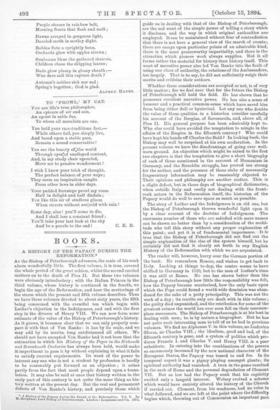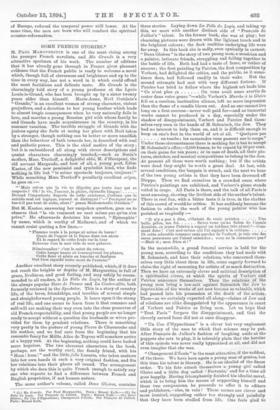BOOKS.
A HISTORY OF THE PAPACY DURING THE REFORMATION.* As the Bishop of Peterborough advances, the scale of his work alters wonderfully little. The first volume, it is true, covered the whole period of the great schism, whilst the second carried matters on to the death of Pius IL But these two volumes were obviously introductory ; with the Italian Princes in the third volume, whose history is continued in the fourth, we begin the age of the Reformation, and hear the mutterings of the storm which the present and fifth volume describes. Thus we have three volumes devoted to about sixty years, the fifth being concerned with the eventful ten which begin with Luther's objection to the Indulgences, and end with the first step in the divorce of Henry VIII. We can now form some estimate of the value of the Bishop of Peterborough's history. As it grows, it becomes clear that we can only properly com- pare it with that of Von Ranke : it has by its scale, and we may add by its merits, long outdistanced all others. We should not have excepted Von Ranke had it not been that the estimation in which his History of the Popes in the Sixteenth and Seventeenth Centuries has always been held, would make it impertinent to pass it by without explaining in what it fails to satisfy current requirements. Its want of the power to interest any one who is not a student by profession is hardly to be reasonably put forward as an objection ; it arises partly from the fact that most people depend upon a trans- lation. It may also be said at once that history written in the early part of this century is not quite the same thing as his- tory written at the present day. But the real and permanent defects of Von Ranke's history, and precisely those which
M. • A History of the Papacy during the Period of the Reformation. Vol. V. By Orolghton, Lord Bishop of Peterborough. London Longman and Co. 1894.
guide us in dealing with that of the Bishop of Peterborough, are the sad want of the simple power of telling a story which. it discloses, and the way in which original authorities are' employed. It can be maintained without fear of contradiction that there is not here a general view of the march of events;. there are essays upon particular points of an admirable kind, there is the most praiseworthy impartiality, and there is the attraction which pioneer work always supplies. But it all forms rather the material for history than history itself. This want of narrative power also led Von Ranke into the fault of using one class of authority, the relations of the Ambassadors, too largely. That is to say, he did not sufficiently weigh their merits and criticise their authors.
Whether these considerations are accepted or not, is of very little matter ; for we feel sure that for the future the Bishop of Peterborough will hold the field. He has shown that he possesses excellent narrative power. lie has also a sense of humour and a practical common-sense which have saved him from being either dull or hysterical. Let any one who doubts the value of these qualities in a historian consider carefully his account of the Borgias, of Savonarola, and, above all, of Pius II. His general purpose has been admirably kept to. Who else could have avoided the temptation to mingle in the affairs of the Empire in the fifteenth century P Who could have kept his hands off Charles the Bold P In looking back, the Bishop may well be surprised at his own moderation. In the present volume we have the disadvantage of going over well- worn ground. An objection which might be raised to the first two chapters is that the temptation to give a short biography of each of those mentioned in the account of Humanism in Germany, and the Renchlin struggle, has proved too strong for the author, and the presence of these slabs of necessarily fragmentary information may be reasonably objected to Their opinions and philosophy are another matter. This is a slight defect, but in these days of biographical dictionaries, when outside Italy and really not dealing with the front- rank actors in the Reformation itself, the historian of the Papacy would do well to save space as much as possible.
The story of Luther and the Indulgences is an old one, but the Bishop of Peterborough throws wonderful light upon it by a clear account of the doctrine of Indulgences. The enormous number of those who are satisfied with mere names can be shown no better than by a consideration of the multi- tude who tell this story without any proper explanation of this point ; and yet it is of fundamental importance. It is true that the Bishop of Peterborough did not find out the simple explanation of the rise of the system himself, but he certainly did not find it clearly set forth in any English History of the Reformation with which we are acquainted.
The reader will, however, hurry over the German portion of the book. He remembers Roscoe, and wishes to get back to Italy. Looking at things to-day, the centre seems to have shifted to Germany in 1520, but to the men of Luther's time it was still at Rome. No one has shown better than the Bishop of Peterborough how little the responsibility was felt, how the Papacy became secularised, how the only basis upon which the Pope could found a world-wide dominion was aban- doned for the sake of a petty principality. This was not the work of a day ; its results only are dealt with in this volume ; the guilty died unpunished, and the retribution for some of the greatest crimes the world has ever seen fell on their common- place successors. The Bishop of Peterborough is at his best in dealing with men ; he is by nature a biographer. But he has not quite such interesting men to tell of as he had in previous volumes. We find no Alphonso V. in this volume, no Ludovico Sforza, no Charles VIII. ; the idealism, good and bad, of the fifteenth century is gone, and a system of politics which pro- duces Francis I. and Charles V. and Henry VIII. is a poor substitute. In entering into the combinations of the powers so enormously increased by the new national character of the European States, the Papacy was tossed to and fro. In its temporal aspect it was a pigmy playing amongst giants ; its spiritual authority had vanished. A turn in the game resulted in the sack of Rome and the personal degradation of Clement VII. But so low had the Papaoy sunk that his captivity excited only a languid interest. Wolsey evolved a scheme which would have entirely altered the history of the Church if carried out. Clement, from his weakness, had no voice in what followed, and we are left at the point where the difficulty begins which, throwing out of Communion an important part
of Europe, reduced the temporal power still lower. At the same time, the men are born who will conduct the spiritual counter-reformation.



















































 Previous page
Previous page